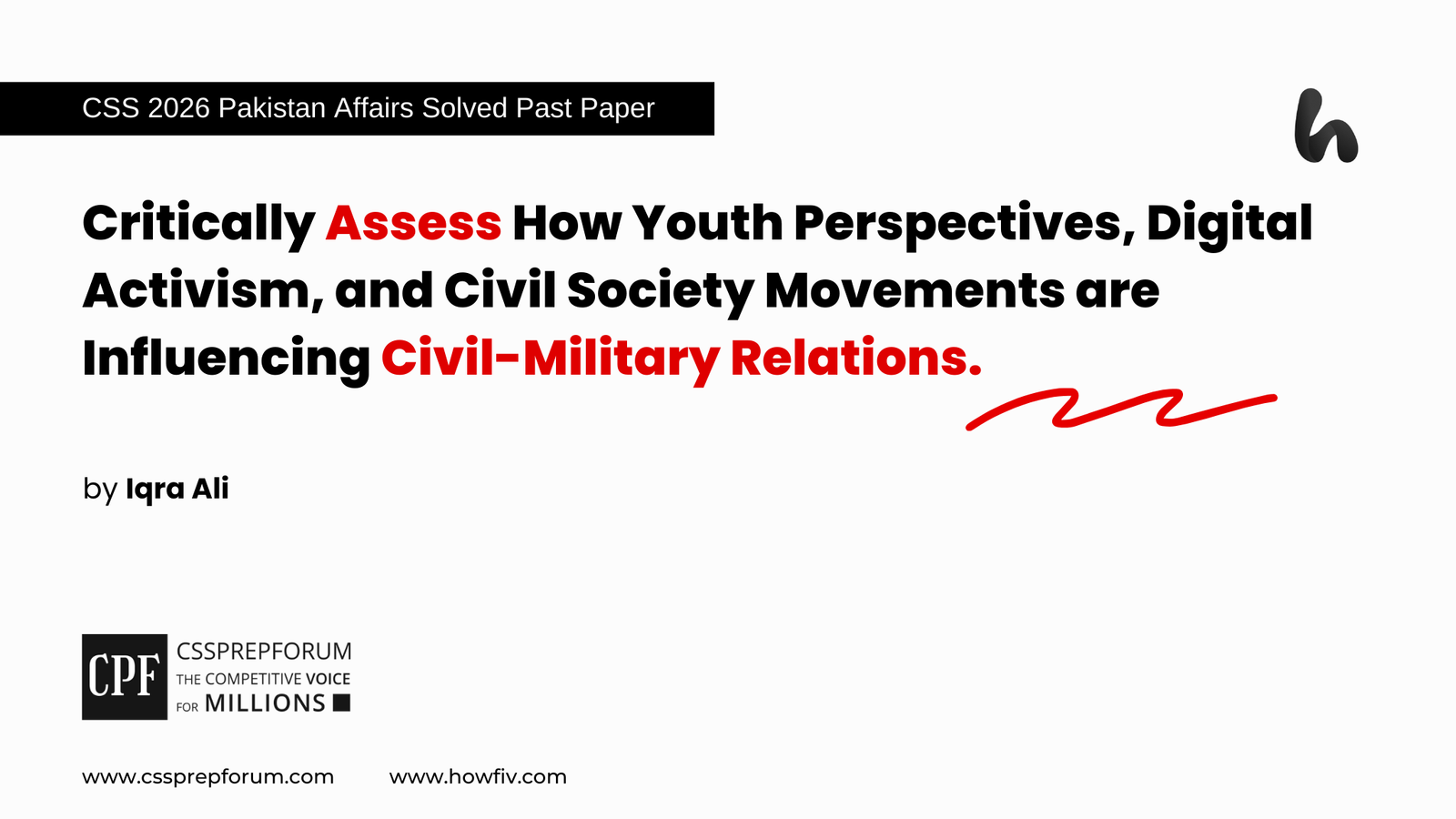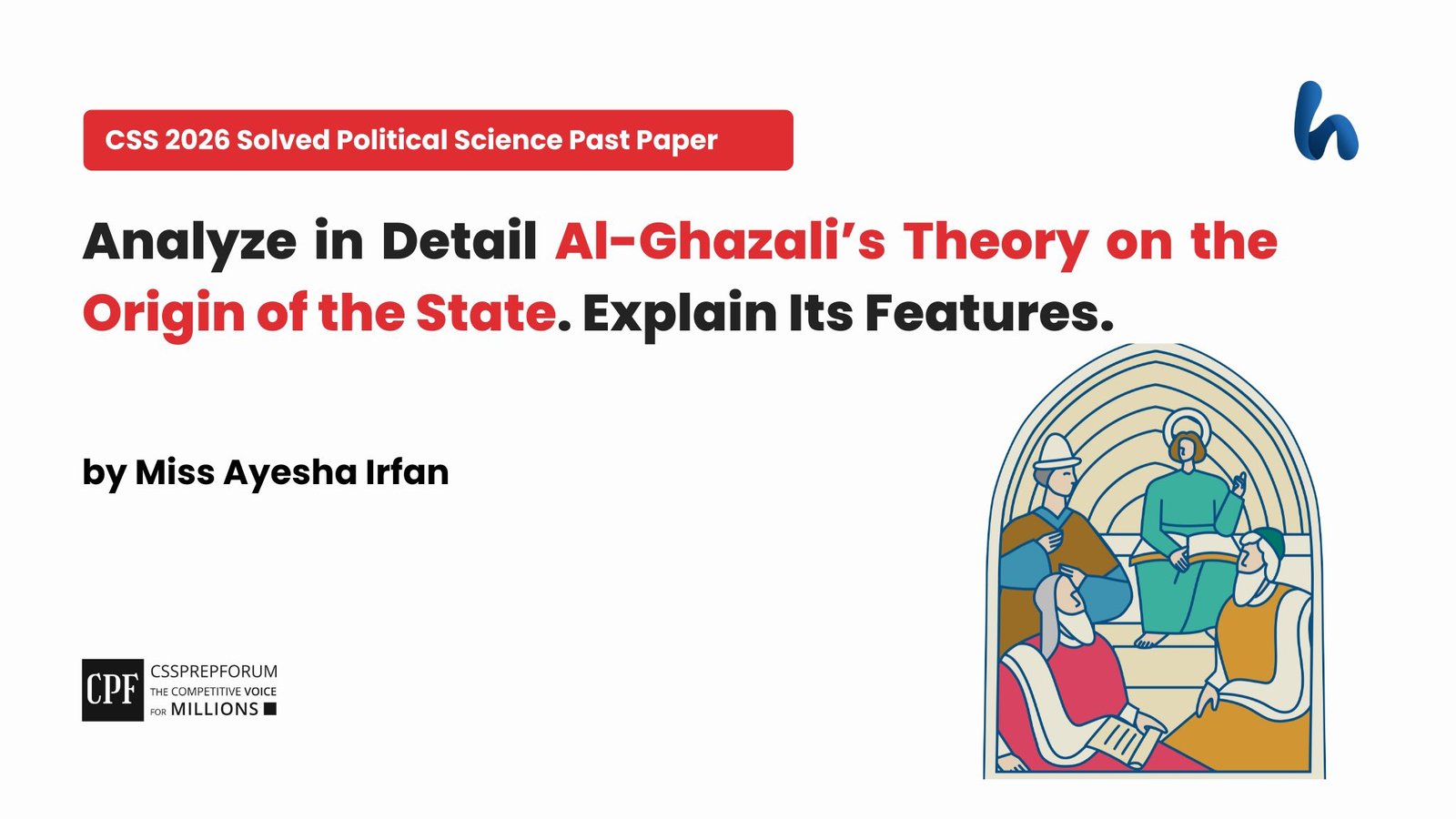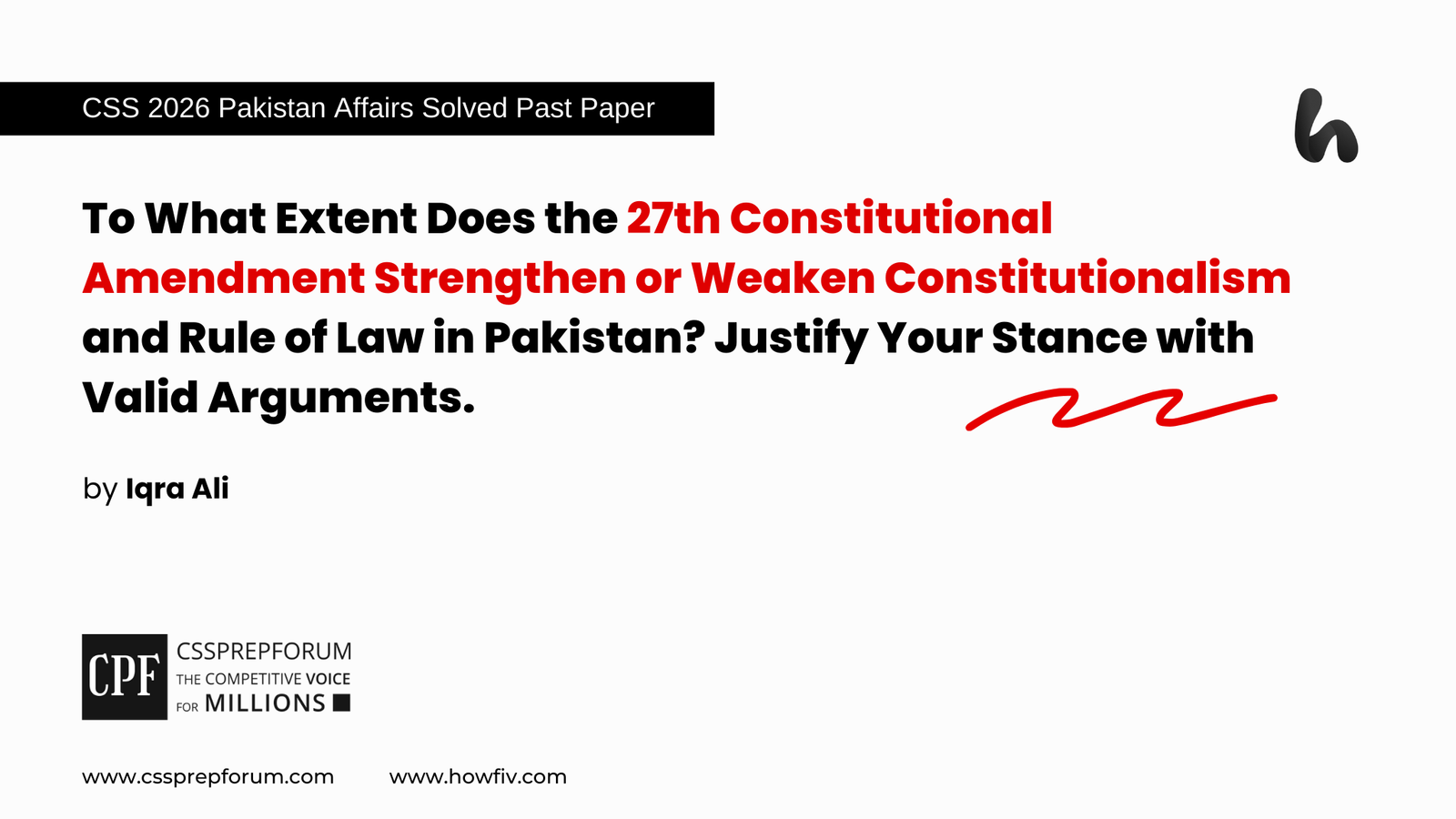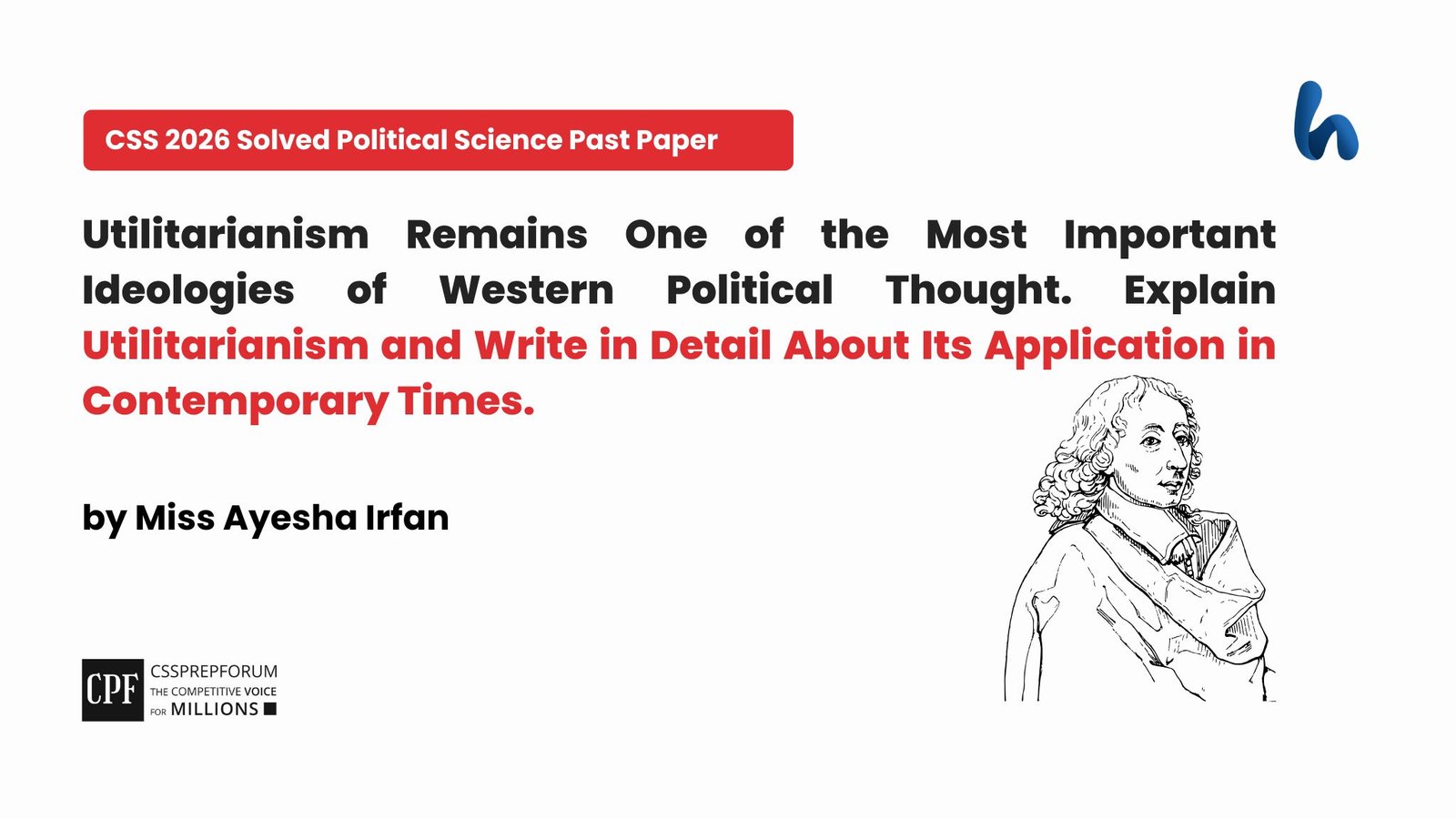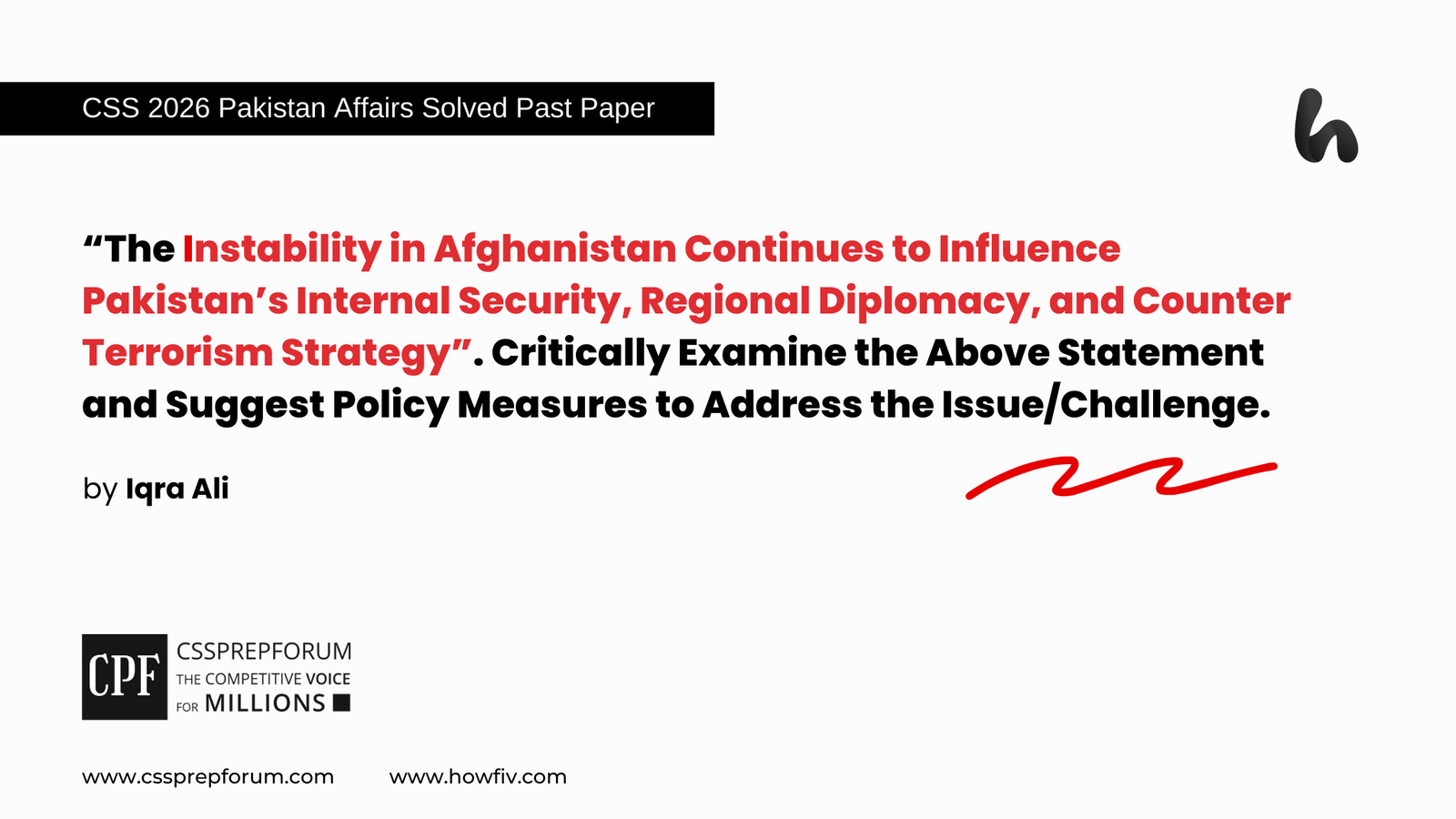CSS 2018 Solved Pakistan Affairs Past Paper | The foundations of Allama Iqbal’s concept of Muslim separatism in the context of the Indo-Pak Subcontinent.
The following question of CSS Pakistan Affairs 2018 is solved by Sobia Sangrasi, under the supervision of Pakistan Affairs Coaches, on the guided pattern of Sir Syed Kazim Ali, which he taught to his students, scoring the highest marks in compulsory subjects for years. This solved past paper question is uploaded to help aspirants understand how to crack a topic or question, how to write relevantly, what coherence is, and how to include and connect ideas, opinions, and suggestions to score the maximum.

Outline
1- Introduction
In the early years of his life, Iqbal was a staunch believer in Hindu nationalism. Albeit, various events in his life enabled him to unfold his ideas about Islamic universalism and Muslim nationalism. Correspondingly, after observing inherent flaws in the political system hindering Muslims’ progress in social, political, economic, and educational life, he decided to step into the political ground to mould the future of the Indo-Pak Subcontinent.
2- Historical Background
- ✓ Out of the blow revolt of 1857
- ✓ Muslims bearing all the consequences of revolt
- ✓ Negation of territorial nationalism
3- Events Forming the Basis for Iqbal’s Concept of Muslim Separatism
- ✓ Annulment of Bengal Partition
- ✓ Promotion of Nehru Report
- ✓ Simon Commission
- ✓ The outcome of Khilafat and the Non-cooperation Movement
- ✓ Promotion of secularism
4- Iqbal and a Separate Muslim Homeland
- ✓ Evolution of Iqbal’s concept regarding nationalism
- ✓ Allahabad address
- ✓ Emphasis on the Two-Nation Theory
5- Conclusion

Introduction
Allama Iqbal, the great Muslim thinker and poet, has keenly supported Indian nationalism. Comprehending the real meaning of Islamic universalism and observing the loopholes in the political system, he came up with the idea of a separate homeland for the Muslims of the sub-continent. His primary concern, however, was the fate of Indian Muslims. Similarly, for the accomplishment of the very task, he observed the then situation of the sub-continent with an eagle eye and concluded to be part of politics. Furthermore, events like the annulment of the partition of Bengal, the report of the Simon Commission, and the Nehru report strongly made him realize the need for a separate Muslim state. Eventually, his sincere efforts shaped the future of millions of people in the sub-continent. Not only did he work politically for the Muslim’s separate homeland, but he also emphasized the importance of Islam and Islamic ideology through his poetry. Similarly, to give practical shape to his idea of Muslim separatism and get rid of prevailing tensions on the Subcontinent, he presented the idea of Pakistan as a separate homeland for Indian Muslims.
Historical Background
The War of Independence 1857 left an impregnable mark on the fate of Muslims of the sub-continent. Even though Indians had an equal share in the revolt of 1857, the Muslims, as a nation, had suffered all the consequences deeply all alone. Ironically, the economic, political, social, and educational life of Muslims was left at stake. Besides, during the era of alien rule, there was a threat to the Muslim religion as well. Their defeat in the war of 1857, nevertheless, fastened the doors of fate for a century. In the same manner, after his stay in Europe, Iqbal observed the European concept of religion that has nothing to do with temporal life but private faith. With this, during his stay in Europe, he saw for the first time that the acceptance of nationalism would mean a negation of the Islamic ideology that hit his soul hardly. Consequently, seeing the backwardness of Muslims in every facet of life, along with the negation of Islamic principles, Iqbal, although not a professional, decided to intervene in politics for the sake of the Muslims of the sub-continent.
Events Forming the Basis for Iqbal’s Concept of Muslim Separatism
A Series of events has taken place after the revolt of 1857 that constrained Iqbal to shift his mind from Hindu nationalism to a separate homeland for Indian Muslims. To begin with, the annulment of the Bengal partition was nothing but an overreaction of Hindus, which was merely controversial to common nationality. Next to it, the proposal of Nehru’s report formed a constitution that was all in favour of the Hindu community with hardly a place for Muslims. Ironically, the rights of Muslims were heavily suppressed by the Hindus. Following that, when Hindus and Muslims were wrangling about the Nehru report, the Simon Commission was presented by the British government to form an on-the-spot enquiry regarding the future constitution. Albeit, Simon’s Commission was rejected by both Hindus and Muslims. Thereafter, Khilafat and Non-cooperation Movement clearly illustrated that Hindus and Muslims were two different nations, as they could not continue unity even after living together for decades. Last but not least, the promotion of secularism by the British and Indians was a blow move threatening Muslims’ identity and ethos crucially, as it condemned religion to the purely personal matters of an individual with no consideration in the state matters, which was a great menace to Islamic ideology. As a consequence, having a bird’s eye view of the entire then situation prevailing in the sub-continent, Iqbal denied the concept of common nationality and gave the idea of a separate nation for the Muslims of the sub-continent.
Iqbal and a Separate Muslim Homeland
Supplementing and, in some ways overpowering, all the threats to the identity of Muslims and Islamic ideology, Iqbal was assertive that the All India Muslim League was the only political party that is empowered to protect the rights of the Muslim community. In addition, the inherent realities of politics and separate religious and cultural entities of Hindus and Muslims brought Iqbal to the stage where all his hopes for Hindu-Muslim unity failed severely. At that time, he acquainted the presidential address at Allahabad in 1930, emphasizing the urge for a separate nation for Indian Muslims, where they can preserve and implement Islamic ideological principles in true means. He stated crystal clear that Muslims’ demand for separation was definitely for free development, which was entirely impossible to achieve under the leadership of Indians. Further, during his Allahabad address, Iqbal stressed the importance of the Two-Nation Theory, both rationally and logically, as he was of the view that Muslims have every right to safeguard their community and culminate it. With that, he also made it vivid that Muslims had their own destiny, including inside and outside the sub-continent. Taking all things together, all the mentioned events lead to the evolution of Iqbal’s thoughts regarding nationalism. As a result, Iqbal clearly stated his motive by saying:
“I would like to see Punjab, the North-West Frontier Province, Sindh, and Baluchistan amalgamated into a single state. Self-government within the British Empire, or without the British Empire, the formation of a consolidated North-West Indian Muslim state appears to me to be the final destiny of the Muslims, at least of North-West Indian.”
Conclusion
In a critical manner, Iqbal has strongly condemned the common nationalism provided that he came to know about inherent political peculiarities causing Muslims to suffer politically, economically, socially, and above all, educationally. No sooner did he realise the very fact through several events, such as the Nehru Report, the Simon Commission, the Bengal Partition, and Khilafat Movement, he intervened in politics for the Muslims’ sake. As a matter of fact, he presented the idea of a separate state for the Muslims of the sub-continent in his presidential address, which paved the way forward for Muslims’ freedom. Thus, by exploring the intrinsic means of Muslims’ demand for partition, he worked sincerely towards the attainment of the goal and, at last, achieved his goal by encouraging the masses to struggle irrepressibly for their rights until the objective is achieved.
CSS 2018 Solved Pakistan Affairs
CSS Solved Past Papers’ Essays
Looking for the last ten years of CSS and PMS Solved Essays and want to know how Sir Kazim’s students write and score the highest marks in the essays’ papers? Then, click on the CSS Solved Essays to start reading them.
CSS Solved Essays
CSS Solved General Science & Ability Past Papers
Want to read the last ten years’ General Science & Ability Solved Past Papers to learn how to attempt them and to score high? Let’s click on the link below to read them all freely. All past papers have been solved by Pakistan’s top CSS GSA coaches having the highest score of their students.
General Science & Ability Solved Past Papers


